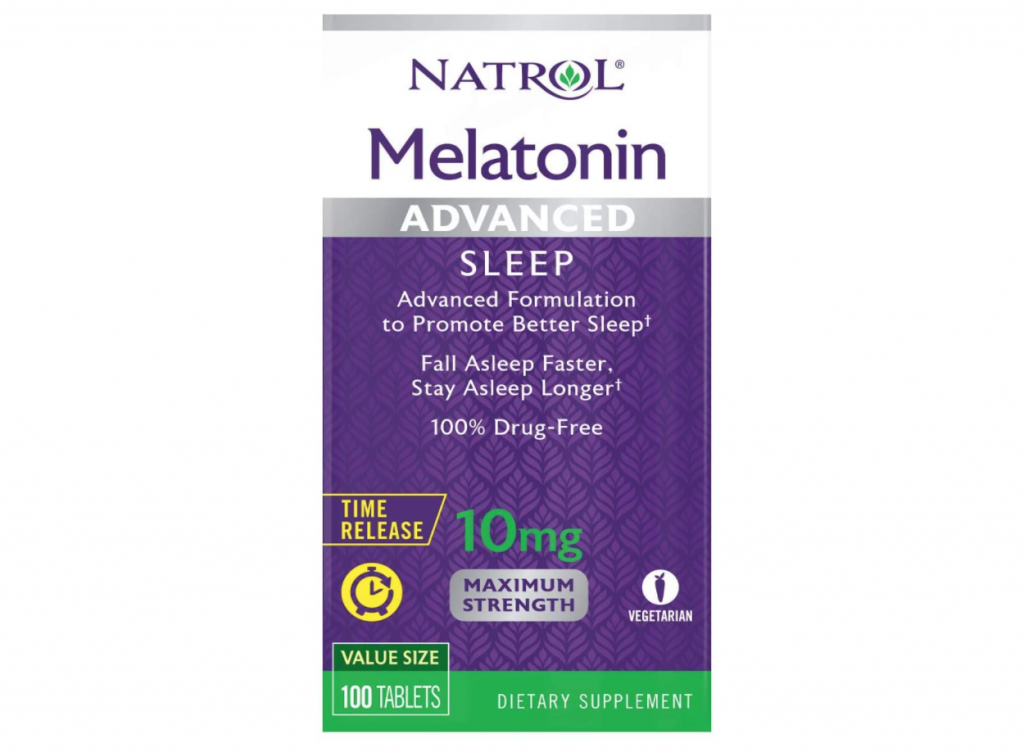How to take melatonin for sleep aid purposes is probably one of the most common queries asked by travelers and insomniacs alike. Because if you’ve ever fought to get your sleep cycle back on track, the first thing most people recommend is melatonin.
And at first, it sounds like the perfect sleep aid – it’s natural, it’s non-addictive, and it gently signals to your body that it’s time for bed without the groggy aftermath à la Valium.
On top of all that, melatonin is an essential sleep hormone that benefits your body in a big way – it helps your heart and vital organs get some much-needed relaxation at night while acting as a powerful antioxidant that clears your cells of toxins and free radicals while your body rests.
But as great as it is, melatonin can also have some pretty undesirable side effects if taken incorrectly, like dizziness and nausea. This is a powerful hormone, after all, and when abused, it can actually destroy your sleep cycle.
We don’t want this to happen to you, which is why we’ve put together a little guide on how to take melatonin the right way. Grab a cup of sleepy time tea and let’s find out how to make this sleep hormone your bedtime friend.
What You Need to Know Before Taking Melatonin For Sleep
People often speak of using melatonin for sleep as if it’s on the same level as a warm cup of chamomile tea or a soothing soundtrack of whale song.
It’s not. Here’s what you should know about what melatonin actually is.
Melatonin is a sleep hormone
That bears repeating: melatonin is a sleep hormone. It’s not a simple sleep aid and it’s not a natural sleeping pill – it’s an essential sleep hormone that your body naturally produces to signal that it’s time for bed.
This means that melatonin on its own will not make you fall asleep like, say, Ambien or Lunesta. What it does do is tell your body it’s time to prepare for bedtime.
Used wisely, you can take melatonin to “trick” your body into shifting its sleep cycle to an earlier or later time by taking melatonin around an hour or two before you want to fall asleep to speed up your body’s preparation for nighttime.
Melatonin is natural, but that doesn’t mean it’s harmless
We all have a tendency to equate “natural” with “harmless.” But keep in mind that many poisons are, in fact, natural (i.e. hemlock, cyanide) and that the difference between medicine and poison comes down to dosage.
This is same with melatonin – a little bit can help you shift your sleep cycle and gently ease your body into sleep mode. But the wrong amount at the wrong times can bring about unwanted side effects.
And it’s not just the question of how much melatonin you should take that’s important – knowing when it take it is crucial as well. Taking melatonin in the daytime has been linked to depression. And taking too much melatonin can result in withdrawn behavior, disorientation, dizziness, nausea, and a whole bag of behavioral issues you don’t want to take on.
Okay, now that we all know what melatonin actually is – let’s find out how to take it…
Who Should Take Melatonin?
Melatonin is not for everyone and it shouldn’t be taken for every kind of sleep ailment. Here’s who should – and who shouldn’t – be taking melatonin for sleep.
DO take melatonin for sleep if you’re going to have a major shift in sleep schedule. If you’re starting a very early morning job or if you’d simply like to reset your internal clock to fall asleep earlier or later than you’re used to, taking melatonin for a week or two is a good way to ease into your new sleep schedule.
DO take melatonin for sleep when you’re jet lagged. If you’re going to be flying halfway across the world and you want to adjust to the new time zone as easily as possible, taking melatonin an hour or two before you want to sleep is a good way to fight off jet lag.
DO take melatonin for sleep if you’re over 60 years old and have difficulty sleeping. Your body naturally produces less melatonin as you grow older, so it may welcome a little more assistance with the sleep-aiding hormone. But this doesn’t necessarily mean you have to resort to melatonin supplements, you can simply load up on foods that contain melatonin for a natural, delicious boost that helps you sleep better.
DON’T take melatonin for sleep if your sleep issues are caused by stress, depression or anxiety. If you’re plagued by troubling thoughts and anxiety that prevent you from falling asleep, melatonin supplements are not going to help since the problem is not with your body’s ability to make its own melatonin.
DON’T take melatonin for sleep if you find that need more than 10mg to help you fall asleep. If 10 mg of melatonin – which is a pretty high dose – isn’t enough, it’s probably not a lack of melatonin production that’s at the root of your sleep issues. Plus, by taking too much melatonin, you’re likely to disrupt your sleeping pattern and suffer from “melatonin hangovers” during the daytime.
DON’T take melatonin for sleep if you’ve become dependent on it in order to fall or stay asleep. If you’ve been taking melatonin for over 2 weeks and “need” it to help you fall or stay asleep, your sleep issues likely stem from another cause like stress, depression, or a circadian rhythm sleep disorder in which your body produces melatonin and other sleep hormones at the wrong time of day. If the latter is the cause, upping your melatonin levels doesn’t fix the problem and can actually contribute to depressive mood disorders.
When to Take Melatonin
It’s best to take melatonin around an hour to two before you plan to sleep. That’s pretty much the perfect amount of time for your body to recognize the melatonin and prepare your body for bed.
But it’s not just about providing your body a dose of melatonin to ease your way into sleep – you also want to prepare your external environment to complement the extra melatonin by turning the lights down and switching off electronics.
This is especially crucial when taking melatonin for sleep during the daytime. Because melatonin is a “darkness signaler,” it can cause adverse effects when used during daytime brightness. The last thing you want to do is send your body clock mixed messages of daytime light signals and melatonin dark signals.
If you need to use melatonin to adjust to a graveyard shift type of sleep schedule, take extra care to prepare your environment appropriately by sealing off your sleeping space from daylight when you take melatonin for sleep.
In the event you took melatonin earlier in the day and want to take some more to help you fall asleep in the evening – don’t do it.
Taking another dose of melatonin if you’ve already taken some earlier that day is not a good idea since too much of the hormone in your body can actually disrupt your sleeping pattern so that you’re waking up in the middle of the night and groggy from a melatonin hangover during the day. The residual melatonin in your system can also convince your body that it’s still nighttime and make it extra difficult for you to wake up.
What are the Best Melatonin Supplements?
Do a quick search for melatonin supplements and you’ll find there are as many options as jelly bean flavors. Most, though, fall under 2 categories: pill or liquid.
Both pills and liquids do the same thing so which type of melatonin supplement you choose comes down to personal preference.
Capsules or tablets are easier to carry around, but also take a little longer to take effect (around half an hour). Liquid melatonin, on the other hand, is quickly absorbed so these are great for people who’d like to take their melatonin immediately before heading to bed.
Simply place few drops of liquid melatonin under the tongue is great for near immediate absorption (around 10 minutes).
Also, with melatonin pills – there are two more options apart from standard melatonin that you might like to consider: fast-dissolve melatonin and time-release melatonin.
The fast-dissolve melatonin pills are exactly what they sound like: they dissolve fast. These typically take around 20 minutes for you to feel the effects.
The time-release melatonin pills are released throughout the night so you might want to consider these if your main issue is remaining asleep throughout the night.
How Much Melatonin Should I Take?
Hmmm. Good question. Because melatonin is available over the counter and not controlled by any FDA regulation or scrutiny, there are no “official doses” and as such, it’s difficult to state the perfect melatonin dosage for each individual person.
A good general guideline is to take 0.3 to 1 mg of melatonin around an hour or two before you want to go to bed. And start small – at the lowest level and then work your way up (if you even need to) until you find the dosage that works best for you.
For adults, a dose between up to 10 mg is generally considered safe. We don’t recommend going past that unless directed by a doctor. Higher doses, such as in the 30 mg range, are considered harmful.
For children, especially younger children, it’s best to avoid melatonin altogether unless it’s used under the guidance of a doctor. Even small doses, such as between 1 to 5 mg, can cause complications and even seizures in young children. Read more about melatonin for kids.
How to Take Melatonin: Wrapping it Up
If all of the above sounds complicated, rest assured – there are really just 3 rules of thumb to follow when taking melatonin for sleep:
- Don’t take melatonin for over 2 weeks at a time. It’s a great sleep aid to help shift sleep schedules and circadian rhythms but it is not a long-term solution. Use it as short-term tool to get on the sleeping schedule you want to be on, not as a bandaid to cover up other sleep problems.
- Don’t take melatonin in the daytime unless you plan on sleeping in the daytime. As mentioned above, melatonin is best taken an hour or two before you plan on going to bed. It gently signals your body for nighttime so you don’t want to take it unless you’re planning on sleeping.
- Don’t take more melatonin than you absolutely need. Start small and don’t go over 1 mg of melatonin per day. Too much can wreak havoc on your sleep cycle – both disrupting your sleep and your waking hours. So begin with small doses.
Sweet dreams 🙂

